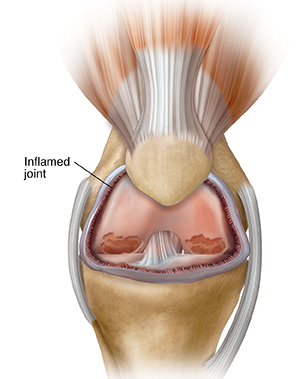Understanding Psoriatic Arthritis
Psoriatic arthritis is joint pain and swelling that occurs in some people who have psoriasis. Psoriasis is a skin disease that causes scaly skin patches. People who have psoriasis may develop psoriatic arthritis later. In some cases, psoriatic arthritis develops before psoriasis.

How to say it
sor-ee-A-tik arthritis
What causes psoriatic arthritis?
Doctors don't know the exact cause of psoriatic arthritis. But it's linked to problems with the body’s infection-fighting system (immune system). Other factors include:
-
Family history. People who have psoriatic arthritis often have relatives with either psoriasis or arthritis, or both.
-
Certain infections. These include strep infections and HIV.
-
Environment. Stress, injury to skin, and certain medicines may trigger psoriasis to become active.
What are the symptoms of psoriatic arthritis?
Symptoms may include:
-
Pain, tenderness, and swelling in any joint, including the spine
-
Joint or back stiffness, especially in the morning
-
Patches of rough skin that are usually red underneath and scaly and white or silver on top
-
Fingernail problems, such as pitted, or crumbly nails, or nails that are detached from the nail bed
-
Pain and swelling where muscles attach to bones
-
Swelling of fingers or toes
-
Eye redness or inflammation
How is psoriatic arthritis treated?
Psoriatic arthritis doesn't go away. It's a long-term (chronic) condition that needs long-term treatment. Medicines are an important part of treatment. These medicines are often used:
-
Prescription or over-the-counter pain medicines to help reduce swelling and pain
-
Prescription medicines that limit the effect of the immune system. They may reduce or prevent joint damage. Methotrexate is a pill commonly used. Biologic and targeted synthetic medicines and skin patches may also be used to treat psoriatic arthritis.
-
Steroid injections in affected joints to help ease symptoms
-
Topical medicines for rough skin patches to ease discomfort and dryness
In addition to medicines, these treatments may be recommended:
-
Regular exercise to improve flexibility and strength
-
Physical therapy to help ease pain and improve flexibility
-
Heat packs to help ease pain and swelling
-
Shoe inserts to keep your feet and ankles stable, and to help with foot pain
What are the complications of psoriatic arthritis?
Possible complications include:
-
Joint damage that gets worse
-
Reduced ability to use affected joints
When should I call my healthcare provider?
Call your healthcare provider right away if any of the following occur:
-
You have a fever of 100.4°F (38°C) or higher, or as directed by your healthcare provider
-
You have pain that gets worse
-
You have symptoms that don’t get better, or symptoms that get worse
-
You develop new symptoms